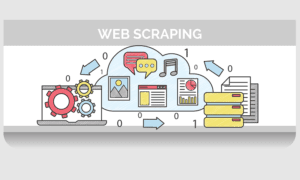In the rapidly changing realm of digital information, web scraping has emerged as a potent tool for unearthing insights from the vast expanse of the internet. As organizations strive to harness the power of data for competitive intelligence, decision-making, and innovation, the ethical and legal dimensions surrounding web scraping have gained prominence. Hence, in today’s world, regulators and society are under a significant obligation to meticulously examine its ethical ramifications, legal ambiguities, and the pressing necessity for regulatory transparency.
Unveiling Insights in the Digital Landscape
Web scraping, the practice of extracting information from websites, has grown exponentially as organizations seek to stay ahead in a data-driven world. The allure of real-time data as a fountain of competitive intelligence is undeniable, yet its application raises crucial questions.
Organizations are increasingly using real-time data to gain a competitive advantage
Real-time data has fundamentally transformed the business paradigm by offering insights that enable swift, informed decision-making. In sectors like finance, the identification of investment prospects through analyzing data from stock tracking websites alongside public data scraped from investment forums has become a potent strategy. For instance, Interactive Brokers employs such insights to craft reports correlating stock mentions on platforms like Reddit’s wallstreetbets forum with stock value fluctuations. Additionally, real-time sentiment analysis, which gauges investor emotions, provides an exclusive tool for predicting market trends and shifts in sentiment. The existence of CNN’s Fear & Greed Index underscores the role of web intelligence in monitoring market sentiment.
Which sector was the first to see the key to the treasure chest of data in this tool?
The financial services sector stands as an early adopter of web scraping technology. The transition from conventional data sources to alternatives like real-time web data has empowered investment firms to glean insights that were previously inaccessible. Apart from finance, e-commerce entities harness real-time data to monitor pricing and reviews across diverse marketplaces. The capacity to compare product prices and gauge consumer sentiment in real time provides companies with a competitive edge by shaping pricing strategies and enhancing product offerings.
Pricing and Competitive Analysis
A pivotal factor in the success of international retailers rests in their capacity to effectively adapt to dynamic changes within the market environment. Web scraping significantly contributes to this strategic adaptation by furnishing companies with invaluable insights for pricing determinations and competitive positioning.
The process commences with automated data collection on prices for products and services from competitors who present their offerings on their respective websites. International retailers can collate and analyze this data, pinpointing trends in price variations, discounts, and promotional activities. This not only enables companies to respond to competitive offerings but also to predict market dynamics in price alterations.
Derived from data procured through web scraping, companies can innovate promotional endeavors aligned with prevalent market trends. This might involve dynamic price adjustments based on relevance, tailored offers, and a plethora of other strategies.
In this manner, web scraping emerges as an indispensable tool for international retailers, enabling swift adaptation to market fluctuations, optimization of pricing strategies, and reinforcement of competitive positioning.
Ethical considerations and confidentiality issues that arise when utilizing public web data
As with any technological advancement, ethical considerations accompany the rise of web scraping. The dichotomy between legitimate data collection and malicious activities is pivotal. Respected scraping practices prioritize the well-being of target servers and distribute requests responsibly. However, the challenge lies in harmonizing data collection with server load to ensure websites are not overwhelmed. Furthermore, while the focus is on publicly accessible data, potential privacy concerns materialize when copyrighted or personal data is scraped sans authorization. As the web scraping panorama evolves, endeavors to institute best practices, instill trust, and advocate for regulatory clarity acquire heightened significance.
The U.S. Ninth Circuit’s landmark ruling shapes the evolving legal landscape of web scraping. Originating from the hiQ Labs v. LinkedIn case, it sets a precedent for regulating web scraping. The ruling highlights complexities, potential global influence, and the need for clear regulations. This decision validates responsible data scraping, encouraging other jurisdictions to adapt. It emphasizes balancing data access benefits with privacy concerns. The ruling clarifies an ambiguous field, emphasizing the importance of legal collaboration and adaptability. In essence, the ruling catalyzes balanced web scraping regulation, promoting innovation while respecting rights in a connected world.
The General Data Protection Regulation (GDPR) and the California Consumer Privacy Act (CCPA) assume critical roles in shaping the landscape of web scraping practices. GDPR directly impacts these practices by governing the acquisition, manipulation, and transmission of individuals’ personal data within the European Union (EU). Should web scraping involve the retrieval of personal particulars, such as names, email addresses, or other identifying information, it squarely falls within GDPR’s domain.
Within the framework of GDPR, the procurement and processing of personal data are only permissible under bona fide circumstances, such as user consent or the necessity to fulfill contractual obligations. In the realm of web scraping, this underscores the obligation of operators to exercise prudence in data source selection, ensure transparency, and empower users with control over their own data.
The effectiveness of regulating web scraping through GDPR is notable. It establishes strict norms for data protection and respects users’ rights and privacy. Violations of GDPR can result in significant fines for web scraping companies that fail to comply with data protection rules. As a result, GDPR has become a crucial factor in the web scraping sphere, demanding adherence to stringent norms and consideration of user rights and privacy in data collection and usage.
Likewise, the California Consumer Privacy Act (CCPA) contributes to the oversight of web scraping by affording specific privileges to residents of California concerning their individual data. It mandates that enterprises reveal their data gathering procedures and enables consumers to decline the sale of their personal particulars. CCPA empowers users with heightened authority over their data and aligns with the principles of conscientious web scraping.
The Imperative for Resolution of Regulatory Clarity
Web scraping exists at the intersection of innovation, ethics, and legal considerations. While its capability to empower businesses with real-time insights is undeniable, it requires conscientious and ethical handling. The recent legal rulings emphasize the pressing need for thorough legal frameworks that strike a balance between the advantages of data access and the concerns regarding privacy and security.
In a world driven by data, the path ahead is clear: to harness the advantages of web scraping while upholding ethical norms and championing comprehensive legal frameworks that pave the way for a conscientious and productive digital future.



































